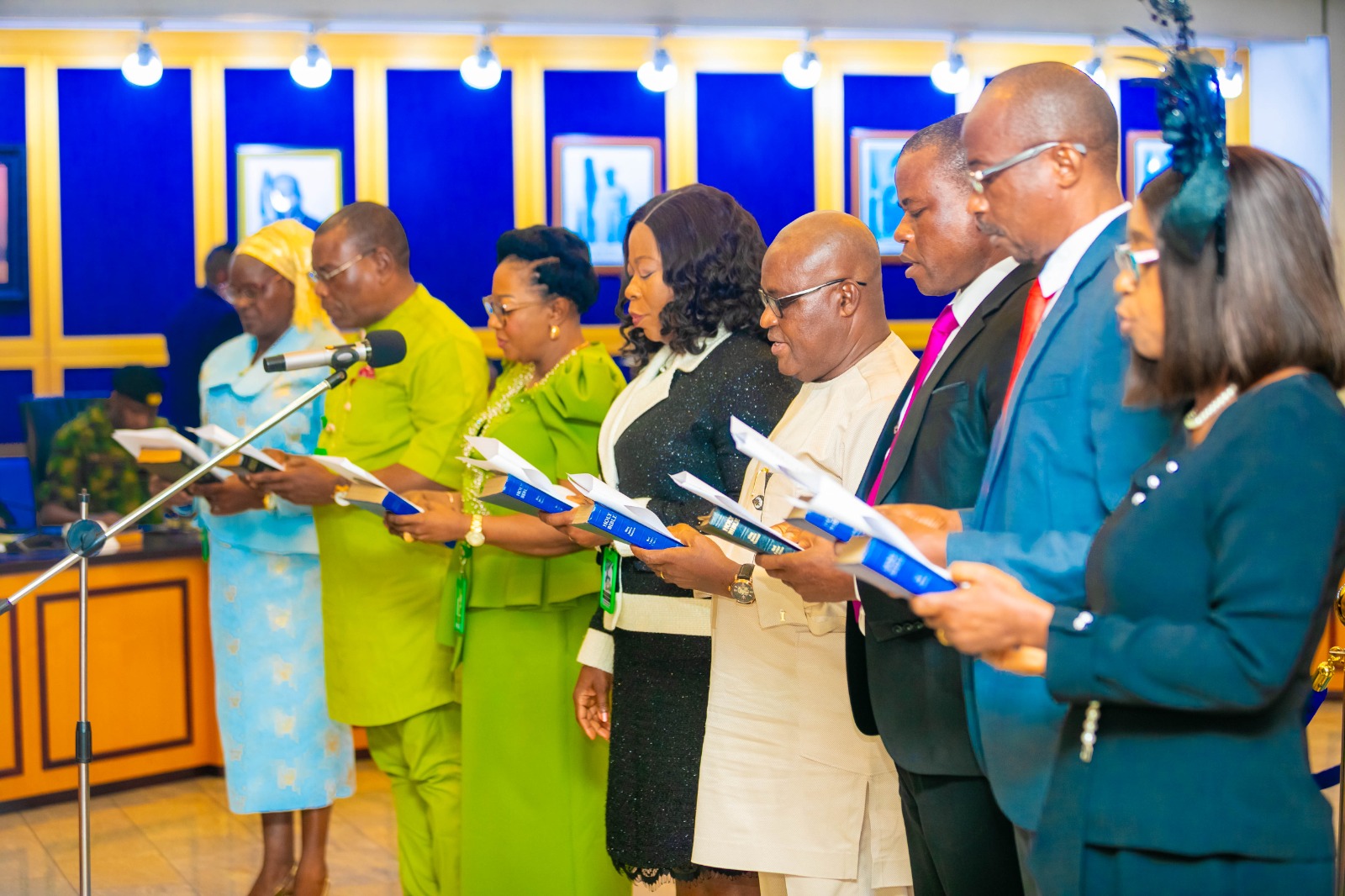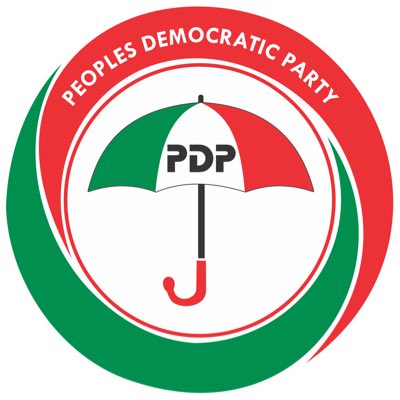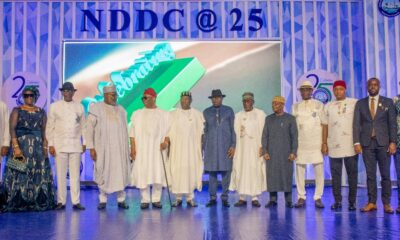News
Nigeria’s Electoral Woes
Nigeria has learnt nothing from its long and chequered train of electoral woes. Nigeria has a very unusually queer habit of ignoring its historical antecedents and facing the future blindly having learnt nothing from her past mistakes.
The first major crises that nearly tore Western Nigeria into shreds with spillover effects to other parts of Nigeria was resultant from a mismanaged election. In fact apart from the 1993 Federal elections, Nigeria has not conducted any credible, free and fair elections. But instead of etching his name in letters of gold in the annals of Nigeria’s history, the then Head of State General Ibrahim Badamosi Babaginda cancelled the most successful and the most popular election in Africa and passed on the winner, Chief M.K.O Abiola to Gen. Sani Abacha to arrest, incarcerate and waste. General Babangida’s reason for cancelling the election then was that many of his top army Generals did not support the Presidency of Chief M.K.O Abiola. What rubbish, what nonsense.
Elections all over the world are always contested with so much gusto and enthusiasm. Let us use this example from the United States of America and even our neighbouring Ghana to show Nigeria the way forward. The American Presidential Election of November 7, 1876 is still till date one of the most disputed elections in American history especially in the States of Louisiana, South Carolina, Florida and Oregon. All over America, the Democratic candidate Samuel J. Tilden won by more than a million popular votes but this was overturned by the Electoral Board (which was controlled by the Republican Party) in favour of R. B Hayes. The 1876 Presidential election dispute gave rise to a crisis, the like of which the United States had never seen. Many Democrats who felt that they had been cheated threatened “Tilden or war”. Congressman Henry Watterson from Kentucky even declared that an army of 100, 000 men was prepared to storm Washington if “Tilden was denied the Presidency.”
Since the American Constitution then was not explicit enough on how to resolve disputes from Electoral colleges, the Senate and the House of Reps voted to establish a Federal Electoral Commission Bill to tackle the existing crisis. And on January 29, 1877, President UIysses S. Grant signed the Electoral commission bill into law. The 15 members of the commission were made up of five Democrats, five Republicans and five Supreme Court Judges. None was appointed by the President.
Despite great opposition from the Democrat-controlled House of the Representatives, the new Electoral Commission voting on party lines (eight Republicans, seven democrats) awarded all 20 disputed electoral votes to the Republican candidate and thus R. B Hayes was sworn in as America’s 19t and most disputed President on March 5,1877. Most bitter democrats later referred to Rutherford B. Hayes as “Rutherfraud” “His fraudulence” and “His Accidency”. An extensive incursion into the American example is to demonstrate man’s ingenuity and ability to conquer his environment and solve his problems as pronounced by God Almighty.
But by far the greatest electoral frauds and manipulations occur more rampantly in African countries. There is really no African country that has not tasted of this bitter pill of electoral violence and crises at one time or the other in its history. Togo, Uganda, Rwanda, Benin, Ethiopia, Zimbabwe, Kenya and the most guilty apart from Nigeria. On the other hand also, there are only few countries in the world without electoral violence and crises. But most of these countries have overcome their electoral crises by either constitutional amendments’ or electoral bills, Americans solved the 1876 debacle by amending their constitution in just four days because it was an emergency. In Africa, Ghana and South Africa have had the best record of credible elections for some time now.
The Electoral Commission of Ghana is the official body responsible for all public elections in Ghana. It was established by the Electoral Commission Act of 1993. The seven founding members including its Chairman, Dr. Kwadwo Afari-Gyan are all still serving their 16 year on the commission. The members are not political appointees neither are they appointed by the Ghanaian President. Their independence is guaranteed by the Ghana Constitution of 1992.
Dr. Afari-Gyan who was invited last week by the Nigerian Democratic Institute and the Nigerian National Assembly to educate them on the way out of Nigeria’s permanent Electoral logjams advised managements of electoral bodies in Africa to “imbibe” transparency and openness to ensure true democracy in Africa.” He chided African politicians for taking elections as a do-or-die affair and that this desperate quest for power at all cost has placed the Electoral Commission in Africa in a difficult position before, during and after the conduct of elections.
He also encouraged and appealed to Civil Society Organisations or NonGovernmental Organisations to actively support and ally with the Electoral Bodies all over Africa. Ghana has a credible electoral body because Ghana has been able to reduce her tolerance level for corruption to zero, while Nigeria’s corruption level still stands at about 95 per cent. Nigeria encourages, pampers and rewards its corrupt officials while Ghana jails any official or even minister who is found guilty of corruption. Today, without mincing words or being sentimental Ghana, is Africa’s best model for democracy and strong democratic institutions.
By far the greatest area of difference between Nigeria and Ghana is the conduct and management of credible elections. While Ghana’s last two elections have been excellent, Nigeria’s last two elections are the worst in the annals of Nigeria’s electoral history, and in Africa as a whole. Nigeria has a litany of electoral woes and unsettled electoral petitions arising from the May 2007 elections.
Governor Olusegun Mimiko of Ondo State was lucky he got back two years of his stolen mandate. The Action Congress gubernatorial candidate for Ekiti State, Dr. Kayode Fayerni is still challenging the incumbent governor before the Ado-Ekiti Election Petition Tribunal in the third year after the May 2007 election. Alhaji Rauf Aregbesola of Osun State has accused the incumbent governor of a stolen mandate and has given enough evidence to declare him the new governor of Osun State.
Hopefully the court will decide that. We all still remember how the Ekiti re-run election was rigged in the glare of television cameras. Comrade Adams Oshiornhole was lucky too; he got his stolen mandate from the avaricious People’s Democratic Party.
Various efforts to reverse electoral mismanagement and fraud have proved abortive as President Umaru Musa Yar Adua has bluntly refused to implement the Justice Uwais Electoral Reform Committee recommendations.
Nanaghan is editor’s guest
Ben Nanaghan
News
Ibas Inaugurates RSIEC, Service Commissions, Healthcare Board In Rivers …Charges Appointees To Embrace Principles Of Service

The Administrator of Rivers State, Vice Admiral (Rtd) Ibok-Ete Ibas, has charged newly appointed Board members to uphold the highest standards of discipline, competence, integrity, and unwavering dedication in their service to the State.
He emphasized that such commitment is critical to stabilizing governance, restoring democratic institutions, and advancing the principles of good governance in the State.
This was contained in a statement by the Administrator’s Senior Special Adviser on Media, Hector Igbikiowubo on Monday.
Ibas issued the charge on Monday while inaugurating the reconstituted Rivers State Independent Electoral Commission (RSIEC), Rivers State Civil Service Commission, Rivers State Local Government Service Commission, and the Rivers State Primary Health Care Management Board at Government House, Port Harcourt.
The Administrator urged the new appointees to embrace their roles with diligence, patriotism, and a commitment to transforming Rivers State through excellent service.
Addressing the Chairman and members of RSIEC, Ibas underscored their pivotal role in ensuring credible local government elections that reflect the will of the people.
“Your task is clear but demanding: to conduct free, fair, transparent, and credible elections at the grassroots level. You must resist bias, favoritism, and external interference while restoring public confidence in the electoral process,” he stated.
“The independence of your actions is crucial to sustaining peace, stability, and grassroots governance. I urge you to act with fairness, impartiality, and professionalism—even in the face of difficult choices,” Ibas added.
The Sole Administrator also charged the Rivers State Civil Service Commission on the need to eliminate mediocrity and foster a culture of excellence through merit-based recruitment, training, and promotions.
“The civil service must transition from favoritism to competence, integrity, and accountability. Your commission will lead reforms, including digital transformation and standardized practices across ministries, departments, and agencies,” he said.
He disclosed that extensive training programmes are underway, with a committee set up to overhaul the public service framework for greater efficiency.
Meanwhile, Ibas urged the Rivers State Local Government Service Commission to ensure professionalism and discipline in local government administration.
“As the closest tier of government to the people, you must drive reforms that insulate the system from politics and mediocrity. Your mandate includes merit-based recruitment, training, and enforcing standards for effective service delivery,” he stated.
In the same vein, the Administrator charged the Rivers State Primary Health Care Management Board with revitalizing healthcare delivery across the state’s 23 local government areas.
“Primary healthcare is the foundation of a sustainable health system. Your board must ensure facilities are adequately staffed, equipped, and operational focusing on maternal health, immunization, malaria control, and community health services,” he said.
He emphasized data-driven operations, incentives for rural health workers, and restoring the referral system to improve healthcare access.
He also assured the Board of sustained government support, including funding, for the effective discharge of their mandates but warned that board members would be held accountable for their performance.
The newly inaugurated members include: RSIEC: Dr. Michael Ekpai Odey (Chairman) with Prof. Arthur Nwafor, Prof. Joyce Akaninwor, and others as members.
Civil Service Commission: Dr. Livinus Bariki (Chairman), Amb. Lot Egopija, Mrs. Maeve Bestman, and others.
Local Govt. Service Commission: Mr. Isreal Amadi (Chairman), Rear Adm. Emmanuel Ofik (Rtd), Dr. Tonye Pepple, and others.
Primary Health Care Board: Dr. Dawari George (Chairman), Dr. Chituru Adiele (Executive Director), Prof. Kaladada Korubo, and representatives from key ministries.
News
Rivers PDP Debunks Sale Of LGA Election Forms

The Publicity Secretary of the Peoples Democratic Party (PDP) in Rivers State, Dr. Kenneth Yowika, has debunked claims that the party has commenced sale of forms for chairmanship and councillorship elections across the 23 local government areas of the state.
Yowika made the rebuttal in a statement made available to newsmen on Wednesday, describing the publication on the social media as baseless and untrue.
He urged members of the PDP to disregard the claim, saying that official communication regarding the sale of forms would be disclosed through the appropriate channels.
“With reference to information trending on social media, it has been falsely claimed that the sale of forms for Chairmanship and Councillorship elections in the 23 Local Government Areas (LGAs) of Rivers State will begin soon.
“However, the party has firmly denied these rumours, stating that they are baseless and untrue.
“The party has its own established methods of reaching out to its numerous supporters.
“The People’s Democratic Party, a law-abiding organisation, will patiently await the release of guidelines from the recently inaugurated Rivers State Independent Electoral Commission (RSIEC) before considering any sale of election forms.
“The PDP is urging its members to remain calm as official communication regarding the sale of forms will be disclosed through appropriate channels,” the statement read.
Enoch Epelle
News
South-South contributes N34trn to Nigeria’s economy in 2024 – Institute
Prof. Pius Olanrewaju, President of the Chartered Institute of Bankers of Nigeria (CIBN), has stated that the South-South region contributes N34 trillion to country’s economy in 2024.
He made the remark at the South-South Zonal Banking and Finance Conference in Calabar, yesterday.
He spoke on the theme, ‘’Building An Inclusive South-South: Economic Diversification as a Catalyst For Development.’’
Olanrewaju, who quoted the data from the Cable Data Index, said the feat was more than 21 per cent of Nigeria’s real Gross Domestic Product (GDP).
The president described the growth as ‘’ impressive,’’ saying that it was not driven by oil alone but significant expansions in trade, services, and the creative industries.
According to him, to fully harness this potential, coordinated financial, technological, and policy support is essential.
“As we work to reposition the South-South for broad-based prosperity, the financial system must play a central role, not merely as a source of capital, but as a catalyst for innovation, ideas incubation, and inclusive economic growth.
“This conference, therefore, provides a strategic opportunity for stakeholders to reimagine the South-South economy, not merely as a resource belt, but as a region of diverse capabilities and resilient enterprises.”
Olanrewaju added that Nigeria must move beyond old models and chart a new course for the development of the South-South region, where financial institutions and stakeholder collaborate to diversify the economy for shared prosperity.
He, however, commended Gov. Bassey Otu for his pledge of land for CIBN Secretariat in Cross River and being the first sitting governor to willingly undergo and complete the Chartered Bankers Programme.
On his part, Gov. Otu said that the conference discussion on the economic diversification in South-South region was timely against the backdrop of global trade and economic volatility that was affecting the nation’s economy.
Represented by his deputy, Mr Peter Odey, Otu said the South-South region must now act with urgency to diversify its economy while leveraging its shared natural endowment in agriculture and extractive resources.
“This conference must help develop tailored financial solutions that reflect the unique strengths and realities of states like Cross River in the south-south.
“Diversification should be evidence-based and must be backed not just by financial advice but project focused financing and real investment support,” he noted.
He said that Cross River had taken the bold step to invest in its agricultural sector by launching an Agro processing hub.
Otu further said that the state had invested in aviation by acquiring more aircrafts for Cally Air, construction of the Bakassi Deep Seaport and injecting N18 billion in its tourism sector.
Similarly, Mr Tolefe Jibunoh, Cross River Branch Controller of the Central Bank of Nigeria (CBN) said that the region was blessed with natural resources, cultural diversities and immense human potentials.
Jibunoh, who was represented by Mr Segun Shittu, Head, Currency Control Office, CBN, Calabar, noted that strategic diversification could unlock unprecedented opportunities for growth in the region.
He added that the CBN remained steadfast to maintain monetary possibilities and promote a sound financial system as a catalyst for sustainable economic development for the benefit of all.
-

 Rivers2 days ago
Rivers2 days agoNDDC Inaugurates Ultra-Modern Market In Rivers Community
-
Opinion2 days ago
Why Reduce Cut-Off Mark for C.O.E ?
-
News2 days ago
Nigeria’s Inflation Rate Dropped To 22.22% In June -NBS
-
Niger Delta2 days ago
Adopt African System Against Crime, Don Urges Security Agencies
-
Politics2 days ago
2027: Group Vows To Prevail On Diri To Dump PDP For APC
-

 Features2 days ago
Features2 days ago25 Years After: NDDC Celebrates Milestones Of Impactful Development
-
Politics2 days ago
Atiku’s Exit No Problem To PDP – Makinde
-

 News2 days ago
News2 days agoRivers Police Arrest Notorious Cultist, Recover Sophisticated Ammunition

